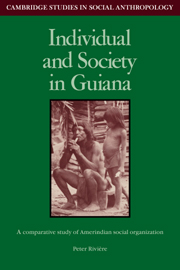Book contents
- Frontmatter
- Contents
- Acknowledgments
- 1 Peoples and approaches
- 2 The settlement pattern: size, duration, and distribution
- 3 Village composition
- 4 The categories of social classification
- 5 Aspects of social relationships
- 6 Autonomy and dependency
- 7 The individual in society
- 8 Guiana society and the wider context
- Notes
- Bibliography
- Index
- CAMBRIDGE STUDIES IN SOCIAL ANTHROPOLOGY
7 - The individual in society
Published online by Cambridge University Press: 01 October 2009
- Frontmatter
- Contents
- Acknowledgments
- 1 Peoples and approaches
- 2 The settlement pattern: size, duration, and distribution
- 3 Village composition
- 4 The categories of social classification
- 5 Aspects of social relationships
- 6 Autonomy and dependency
- 7 The individual in society
- 8 Guiana society and the wider context
- Notes
- Bibliography
- Index
- CAMBRIDGE STUDIES IN SOCIAL ANTHROPOLOGY
Summary
Although in the last chapter we described the political relationships that exist both within a settlement and between settlements, we avoided the far more difficult question of the nature of politics in the region. It is often said that the societies of Lowland South America lack, or at the best have poorly developed, political institutions. Clastres has argued that no true political anthropology can evolve while we insist on defining other peoples' political structures in negative terms: what they have not got in comparison with us. However, in the same breath, Clastres goes on to deny that the economy of Lowland South American societies is a political economy (1977:168). His argument is that in primitive societies the economy is not autonomous but is embedded in sets of other relationships. Although I accept Clastres's characterization of the economy as embedded I cannot agree with the conclusion he draws from it that there is no political economy. In contrast to Clastres, one may cite Turner, who writes:
Gê and Bororo social structure appears … as a form of political economy based on social rather than material production and reproduction. … It is a political economy based upon the exploitation of young women and men actively engaged in producing the basic social units of human production … by older men (and to a lesser extent older women), who form a dominant ‘class’ by virtue of their control of the crucial means of production (in this case, the obligatory setting of the productive activity in question), the residential household. (1979:168)
Turner's remarks are not fully applicable to the Guiana region because of the differences in social organization that exist between the peoples of the respective regions.
- Type
- Chapter
- Information
- Individual and Society in GuianaA Comparative Study of Amerindian Social Organisation, pp. 87 - 100Publisher: Cambridge University PressPrint publication year: 1984



